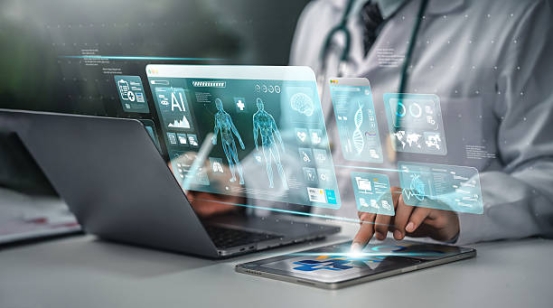AI Is Revolutionizing Health Data Analytics by 2025
The integration of AI into health data analytics is transforming patient care, operational workflows, and health outcomes. By enhancing predictive modeling and real-time insights, AI enables early illness detection, personalized interventions, and improved medical decision-making.
The integration of AI into health data analytics is transforming patient care, operational workflows, and health outcomes. By enhancing predictive modeling and real-time insights, AI enables early illness detection, personalized interventions, and improved medical decision-making.

The Expanding Role of AI in Health Data Analytics
By 2025, AI-driven analytics will reshape healthcare operations, optimizing patient outcomes and resource allocation. Predictive modeling and advanced data-processing tools are helping providers identify inefficiencies, reduce costs, and enhance revenue streams while supporting proactive, data-driven care strategies. The rapid growth of AI in this space reflects its increasing importance in both clinical and administrative decision-making.
Enhancing Care Through Predictive and Real-Time Insights
Predictive analytics allow clinicians to identify at-risk patients early, facilitating timely and tailored interventions. Real-time AI analysis provides instant diagnostic insights and monitoring capabilities, improving response times in critical care scenarios and reducing reliance on traditional trial-and-error approaches. This targeted methodology elevates both patient safety and treatment efficacy.
AI’s Contribution to Medical Decision-Making
AI fosters collaboration across interdisciplinary healthcare teams, enhancing comprehensive treatment planning. Integration with genomic data enables personalized therapies based on patients’ unique genetic profiles, increasing treatment success rates. Generative AI further supports individualized diagnostics, predictive assessments, and precision medicine, redefining conventional healthcare practices.
IoMT and Wearable Technology Transforming Patient Monitoring
The Internet of Medical Things (IoMT) and wearable devices are expanding the scope of remote healthcare. AI-enabled IoMT facilitates continuous, real-time monitoring of chronic conditions, allowing timely interventions and more personalized care. Maintaining data integrity, governance, and privacy remains essential as these technologies proliferate.
Strategic Considerations and Future Challenges
While AI promises remarkable benefits, challenges persist. Healthcare leaders must address rising costs, implement AI efficiently, and optimize labor utilization while adhering to ethical and regulatory frameworks. Balancing innovation with compliance is crucial to ensure safe, effective, and responsible AI adoption.
Preparing for the AI-Driven Healthcare Future
Understanding AI’s potential in health data analytics allows stakeholders to proactively adapt to 2025’s evolving healthcare landscape. By improving patient outcomes, streamlining operations, and enhancing collaboration, AI paves the way for advanced, patient-centric care. Embracing these innovations today sets the stage for a more efficient and effective healthcare ecosystem tomorrow.
Sources
Healthcare Data Analytics Transforming Patient Care
Innovation in Healthcare Analytics 2025
AI Thriving in Chaos: 2025 Health Analytics
AI Trends in Healthcare Overview
